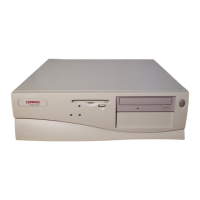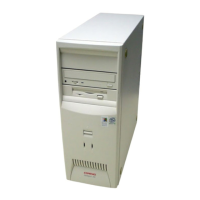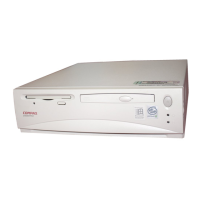Technical Reference Guide
Compaq Deskpro Personal Computers
Third Edition - April 2001
3-3
3.2.2 PENTIUM III PROCESSOR
The Pentium III processor’s architecture (Figure 3-3) includes the same core functionality as
described previously for the Celeron processor but includes a larger, 8-way set-associative L2
ECC cache, additional processing features, and higher processing speeds.
Figure 3–3. Pentium III Processor Internal Architecture
The following table lists the key statistics of supported Pentium III processors:
Table 3–2. Pentium III Processor Statistical Comparison
Table 3-2.
Pentium III Processor Statistical Comparison
Processor
Part
Marking
Core/L1/L2
Speed
Core Voltage
(VccP)
Max. Power
Consumtion
Pentium III 600 SL4CL 533-MHz 1.65 VDC 15.8 W
Pentium III 667 SL4CJ 600 MHz 1.65 VDC 17.5 W
Pentium III 733 [1] SL4CG 733 MHz 1.65 VDC 18.3 W
Pentium III 800 [1] SL4CD 800 MHz 1.65 VDC 20.8 W
Pentium III 866 [1] SL4CB 866 MHz 1.65 VDC 22.9 W
Pentium III 933 [1] SL4C9 933 MHz 1.65 VDC 24.5 W
Pentium III 1.0 [1] N/A 1.01 GHz 1.70 VDC 26.1 W
NOTE:
FSB of all processors operates at 133 MHz.
Statistics are for C-step processors.
[1] Standard configuration processor.
The Pentium III processor is software-compatible with Celeron, Pentium II, Pentium MMX,
Pentium, and x86 processors. The Pentium III processor also features 70 FPU-based streaming
SIMD extensions (SSE) that, when implemented by appropriate software, can enhance 3D
transforming and speech processing operations. Operating system requirements for SSE support
are as follows:
Operating System
Level of SSE Support
Windows 95 No SSE support
Windows 98, OSR0 SSE support though ISV and OpenGL 6.1 applications only
Windows 98, OSR1 SSE support though ISV, OpenGL, and DirectX applications
Windows 2000 SSE support with ISV, OpenGL, and DirectX applications
Windows NT 4.0 SSE support requires driver and Service Pack 4 (SP5 recommended)
Core processin
speed
Host bus speed
or
Pentium III
CPU
FPU
32-KB
L1
Cache
256-KB
L2
Cache
FSB
I/F

